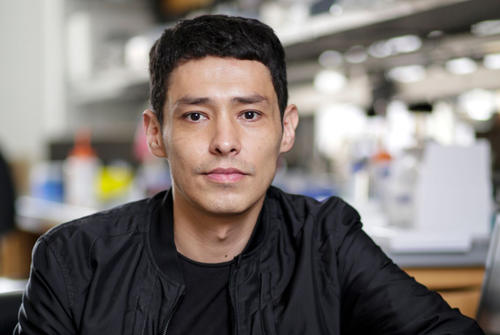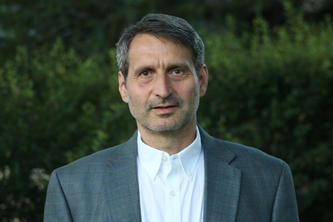
University of Minnesota postdoctoral associate Jose L. Alejo, PhD, has been named a Hanna H. Gray Fellow by the Howard Hughes Medical Institute (HHMI). As one of 15 Fellows announced this month, Alejo will receive mentoring and research funding up to $1.4 million that will span eight years.
“This is a remarkable opportunity,” said Alejo. “All of the Hanna H. Gray Fellows, including myself, are receiving the best possible start to our academic and research careers.”
As a recent PhD graduate, Alejo’s research is tied to the ribosome—which is used by all living cells to translate genetic code into protein—at the University of Minnesota’s College of Biological Sciences (CBS). His research goal is to develop a platform to evolve and engineer the ribosome.
“The plan is to create a ‘library’ of different versions of the ribosome so we can select specific ones for various functions,” said Alejo. “This can lead to better understanding of molecular assembly, antibiotic action and of the origins of life itself.”
Alejo’s interest in ribosome research stems from his work as a graduate student at Weill Cornell Graduate School of Biomedical Sciences. It is this line of research that led Alejo to CBS Assistant Professor Kate Adamala’s Protobiology Lab. Adamala, whose research focuses on synthetic cells and protein engineering technologies, is now Alejo’s HHMI mentor.
“We're very excited about the direction the ribosome evolution platform will enable,” said Adamala. “If we can tune and reprogram ribosomes, we will be able to engineer new production pathways, study ribosome diseases and perhaps even make a synthetic cell running on entirely different rules.”
Currently, Alejo’s research is focused on developing the techniques required to mutate, detect and select ribosome functions.
“Once the platform is functional, there are diverse avenues of research we want to explore,” said Alejo. “This fellowship gives us the freedom and focus required to pursue a project of this scope, complexity and impact.“
Applications for the next group of HHMI’s Hanna H. Gray Fellows is now open. Along with supporting early career scientists, the program aims to recruit and retain emerging scientists who are from gender, racial, ethnic and other groups underrepresented in the life sciences. Learn more about the application process and eligibility requirements on HHMI’s website.
###
About the College of Biological Sciences
The College of Biological Sciences at the University of Minnesota is one of two colleges in the United States dedicated to the biological sciences with undergraduate majors and graduate programs that cover the spectrum of life from molecules to ecosystems. Learn more at cbs.umn.edu.
About the Howard Hughes Medical Institute
HHMI plays an important role in advancing scientific research and education in the U.S. Its scientists, located across the country and around the world, have made important discoveries that advance both human health and our fundamental understanding of biology. The Institute also aims to transform science education into a creative, interdisciplinary endeavor that reflects the excitement of real research. HHMI’s headquarters are located in Chevy Chase, Maryland, just outside Washington, D.C.
- Categories:
- Science and Technology





